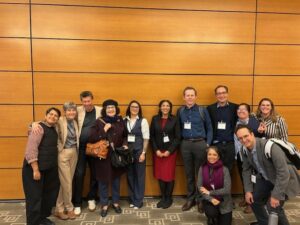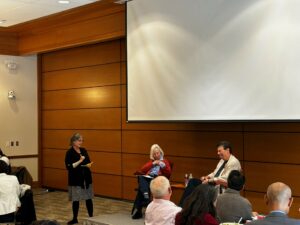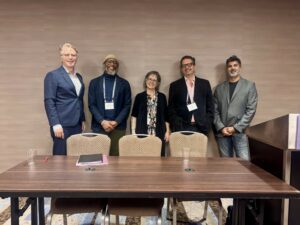When New Legal Realism (NLR) began two decades ago as a movement, its ambition was both simple and radical: to study law not only as doctrine, but also as lived experience. Twenty years later, that mission feels newly urgent. Originating at the American Bar Foundation (ABF) and a few US law schools, NLR has evolved into an interdisciplinary effort to understand how law operates in practice: how it reflects, reinforces, and sometimes resists power. Its twentieth anniversary in 2025 was marked by a series of gatherings and reflections on the movement, beginning with a major conference.
NLR’s Emergence and Intellectual Roots

NLR emerged in the early 2000s under the leadership of ABF Research Professor Elizabeth Mertz, along with Jane Larson, Heinz Klug, and Stewart Macaulay of the University of Wisconsin Law School; David B. Wilkins of Harvard Law School; and Martha Albertson Fineman of Emory University School of Law. These early leaders were joined by interdisciplinary scholars affiliated with the ABF, including Bryant Garth, Arthur McEvoy, Laura Beth Nielsen, Robert Nelson, Thomas W. Mitchell, and Sally Engle Merry, as well as researchers from across the country—and eventually the world—who sought to connect empirical legal research more directly to legal doctrine and practice.
The NLR movement was inspired by early twentieth-century legal realists like Karl Llewellyn, who recognized that law on the books often diverges from law on the streets. But the legacy of the early legal realists had splintered: While mainstream legal scholars returned to reforming legal doctrine from within, others formed the then-nascent law and society movement, exploring law’s social dimensions but often remaining too far removed from legal practice to shape it. NLR set out to bridge that divide.
“Through rigorous engagement with legal doctrine, various theoretical frameworks, and both qualitative and quantitative empirical methods, NLR demonstrates the symbiotic relationship between law, culture, and society,” said Jeffrey Omari, one of the movement’s emerging leaders, a former ABF doctoral fellow, and a current Associate Professor at Seattle University School of Law. “Understanding this connectivity provides the bridge between ‘law on the books’ and ‘law in action.’”
By combining the empirical depth of law and society research with sophisticated engagement in legal texts and institutions, NLR developed a framework in which qualitative and quantitative methods could inform scholarship and remain legible to practitioners and policymakers. Its early key publications and conferences laid the groundwork for this approach, including paired special issues of journals from the initial NLR conference in 2004 in ABF’s peer-reviewed journal Law & Social Inquiry and the Wisconsin Law Review. Meanwhile, NLR scholars led trainings in sociolegal research methods and spearheaded what remains a vibrant Collaborative Research Network through the Law & Society Association.
By its tenth anniversary in 2015, NLR had grown into a vibrant intellectual community. A milestone conference cohosted by the ABF and University of California Irvine School of Law helped set out core questions: How far has NLR come, and where should it go next? The conference’s discussions and reflections on this question were published in 2016 in a UC Irvine Law Review symposium and a 2018 symposium in Law & Social Inquiry.
Additional signal publications appeared in 2016 and 2017 as edited volumes that gathered emerging scholars and research questions. Cambridge University Press issued The New Legal Realism, Volumes I and II, and Oxford University Press published a volume assessing how legal language engages with social science, highlighting how assumptions underlying standard legal practices could improve delivery of justice. By 2021, NLR scholars produced the Research Handbook on Modern Legal Realism (Edward Elgar), bridging jurisprudence, doctrinal analysis, sociolegal research, pedagogy, clinical and critical approaches, and global perspective.
As it matured, the movement also became more self-reflective, acknowledging its embeddedness in institutions shaped by power and inequality and turning toward questions of inclusion, ethics, and global perspective. That shift came fully into focus at the recent twentieth-anniversary conference that invited scholars to “widen the lens” on the empirical study of law.

Widening the Lens Conference Marks Twentieth Anniversary at Harvard Center on the Legal Profession
On October 18–19, 2024, the American Bar Foundation and Harvard Law School’s Center on the Legal Profession cohosted “Widening the Lens: New Legal Realism and the Future of Legal Empiricism,” a landmark conference at Harvard Law School marking NLR’s twentieth anniversary. The major interdisciplinary conference reflected on inclusion, “bleached out” identity, and ethics in legal education while reaffirming the methodological pluralism at NLR’s core and expanding the conversation to include emerging empirical approaches.
Panels brought together perspectives that are often siloed: research exploring ethics in law school classrooms; quantitative and qualitative examinations of professional identity formation during law school; analyses of the quiet reinscription of racial and other inequalities in law and its teaching, and investigations of law reform and innovations in legal pedagogy.
Former and current ABF doctoral fellows, along with scholars from the United States, Canada, and the United Kingdom, participated in collaborative sessions. Former ABF Neukom Chairs Rachel Moran and Meera Deo provided guidance and inspiration for emerging and established scholars. The keynote luncheon featured former Harvard Law School Dean Martha Minow interviewing Professor David Wilkins, honoring his leadership in the field. The program also highlighted the ongoing leadership of a new generation in NLR that includes Jeffrey Omari, Shauhin Talesh of UC Irvine School of Law, and Riaz Tejani of University of Redlands. Collectively, the event showcased the evolution of NLR scholarship and the scholars expanding its reach for a new era.
“What struck me most,” said Darrell G. Mottley, an AFB board member and an Assistant Clinical Professor of Law at Suffolk University, “was the sense of continuity. You could see how a new generation of scholars and practitioners are carrying the New Legal Realism movement forward, building on its foundations while asking harder, more urgent questions about law in everyday life.”
Many of the insights raised at the conference were echoed months later at a spring roundtable at the 2025 Law and Society Association annual meeting in Chicago, where the conversation turned to NLR’s relevance amid global political upheaval.
Roundtable Reflections on NLR in an Era of Populism

At the 2025 Law and Society Association meeting, a May 23 roundtable also marking NLR’s twentieth anniversary brought together scholars to explore the movement’s role in an era defined by populism and global uncertainty. Moderated by Riaz Tejani and featuring panelists Jeffrey Omari, Pablo Rueda-Saiz (University of Miami School of Law), and Richard Ashby Wilson (Princeton University), the discussion was informed in part by a December 2024 Connecticut Law Review article “New Legal Realism at 20: Rethinking Law in an Era of Populism and Social Movements,” which examined how right-wing populism and escalating threats to the rule of law are reshaping public faith in rights discourse.
When asked what history can teach us about this moment, Wilson described today’s instability not as a break from the past but as an intensification of longstanding patterns. Drawing on fieldwork in Brazil, Omari cautioned that authoritarian regimes often appear deceptively normal—until they don’t. Today’s coups, he noted, tend to unfold through legal channels and “the consolidation of power in the executive branch.” Rueda-Saiz argued that US legal scholars remain too insular, avoiding comparisons with non-European countries whose legal trajectories, he emphasized, “have deep implications for what’s going on in the United States.”
The conversation underscored the personalization of power in contemporary politics, the decline of due process, and the growing suspicion toward rights-based discourse. Yet it also revealed the enduring promise of NLR within this fractured landscape. Rueda-Saiz observed that today’s law students are eager to engage across ideological divides, making law schools key spaces for NLR’s influence. He urged scholars to study not only how law functions as a tool of oppression but also how lawlessness itself is legitimized. Omari echoed this point, describing NLR’s strength as its ability to pair doctrinal engagement with diverse empirical methods.
In a moment when legal institutions are under siege, the panel made a compelling case for NLR as a response to contemporary threats.
New Legal Realism in the Twenty-First Century
Two decades into the NLR movement, as democracy faces renewed strain and technology reshapes the practice of law, NLR’s call to ground legal scholarship in lived experience feels as urgent as ever. As the Harvard conference and LSA roundtable made clear, if the early years of NLR were about translating between disciplines, the current moment is about making it more attuned to how legal authority is constructed by observing how real people invoke, resist, ignore, or reshape the law. This includes not only lawyers and judges but also migrants, protestors, bureaucrats, and those who experience law primarily through its absence.
The movement has also broadened its methodological frame, embracing critical race theory, feminist methods, and postcolonial critique as central. These approaches are not mere tangents or subfields but vital for understanding how law distributes vulnerability and authority and how legal outcomes emerge from the interaction of “top-down” policies and “bottom-up” social action.
By focusing on the interplay between law, power, and social processes, NLR continues to refine its empirical and conceptual tools, offering a lens through which scholars can understand law as a living, contested, and socially embedded phenomenon.
###
About the American Bar Foundation
The American Bar Foundation (ABF) is the world’s leading research institute for the empirical and interdisciplinary study of law. The ABF seeks to expand knowledge and advance justice through innovative, interdisciplinary, and rigorous empirical research on law, legal processes, and legal institutions. To further this mission the ABF will produce timely, cutting-edge research of the highest quality to inform and guide the legal profession, the academy, and society in the United States and internationally. The ABF’s primary funding is provided by the American Bar Endowment and the Fellows of The American Bar Foundation.
